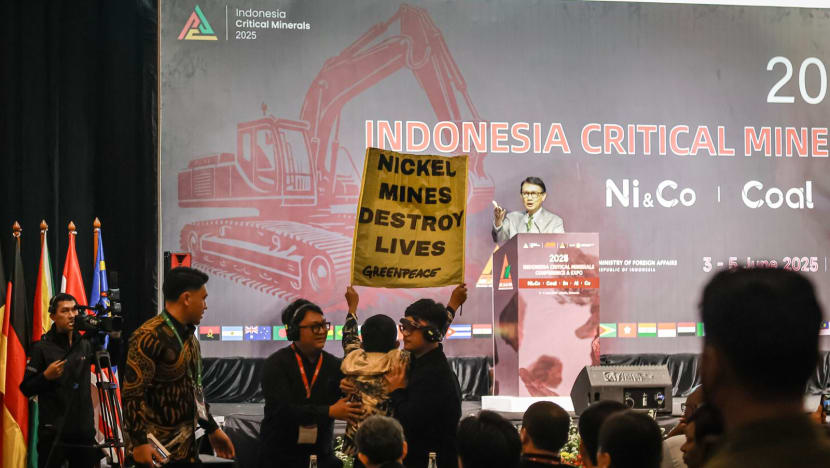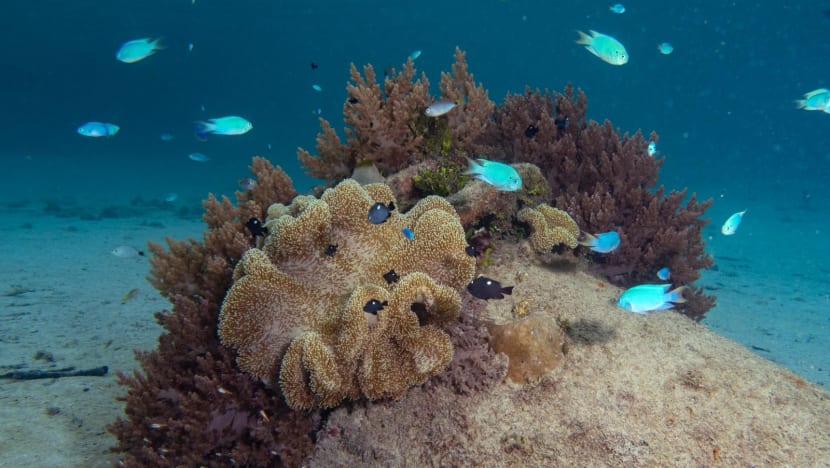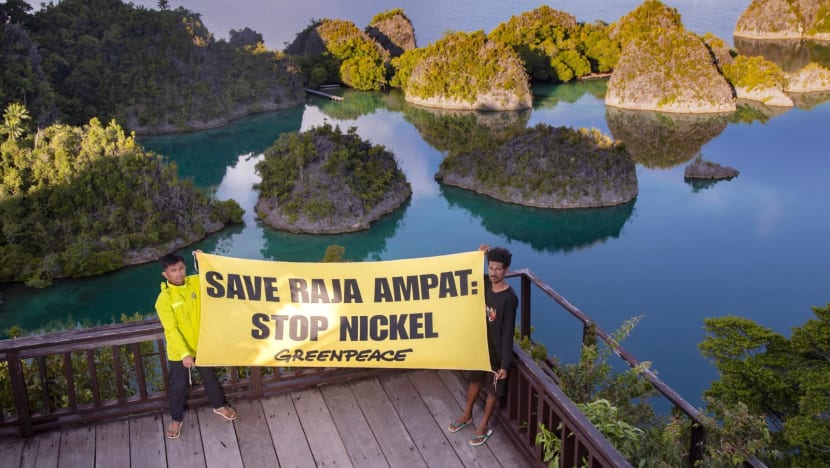Indonesia probes alleged nickel mining in world-renowned coral reef haven Raja Ampat
Over 500 hectares of forest and native vegetation have been cleared for nickel mines on the islands of Gag, Kawe and Manuran in West Papua, resulting in soil runoff and sedimentation that endangers coral reefs and marine ecosystems, according to a study by Greenpeace Indonesia.
.jpg?itok=qJG44YDg)
Greenpeace Global Head of Indonesia Forest Campaign, Kiki Taufik, holds a banner underwater in the UNESCO Global Geopark area of Raja Ampat, Southwest Papua. (Photo: Greenpeace)
JAKARTA: Indonesia is investigating alleged nickel mining in Raja Ampat amid growing concerns about environmental damage to one of the world's top marine biodiversity hotspots.
An official from the Environment and Forestry Ministry confirmed on Wednesday (Jun 4) its law enforcement division is probing the situation.
Her comments came a day after activists from non-governmental organisation (NGO) Greenpeace Indonesia staged a peaceful protest in Jakarta at an environmental conference attended by Deputy Foreign Minister Arif Havas Oegroseno.
Raja Ampat, in Southwest Papua province, harbours an estimated 75 per cent of the world’s known coral species. Designated as a UNESCO Global Geopark, the archipelago is also home to over 2,500 species of fish, according to Greenpeace Indonesia.
“We are currently following up and developing steps for law enforcement,” said Rosa Vivien Ratnawati, secretary of the ministry’s Environmental Control Agency, at a sustainability forum in Bali on Wednesday, reported the Jakarta Globe.
The previous day, Energy and Mineral Resources Minister Bahlil Lahadalia said he would summon companies, whether state-owned or private entities, with nickel mining permits in Raja Ampat for a review.
“We will review this with my directors. I will call the owners in. There must be local values that must be respected,” Bahlil was quoted as saying by Jakarta Globe on Tuesday at the sidelines of the Human Capital Summit in Jakarta.
On Thursday (Jun 5), Bahlil told reporters that the company operating in Raja Ampat is Gag Nikel, which is owned by state-owned mining company Antam.
Bahlil said he would go to West Papua in the coming weeks and would likely visit Gag island, one of the islands cited by Greenpeace. “Why? Because I want to be objective. So that there is no confusion," he said.
In the meantime, he said he would halt the operation of Gag Nikel.
At the Indonesia Critical Minerals Conference and Expo on Tuesday, a group of protesters was seen walking into the event venue with large banners as deputy minister Arif was speaking.

Some of the banners read “Nickel mines destroy lives”, “Save Raja Ampat from nickel mining” and “What’s the true cost of your nickel?”.
Greenpeace said in a press release that its youth activists as well as four young West Papuans from Raja Ampat were involved in the demonstration, intended to warn government officials and industry leaders about the environmental and social costs of nickel extraction.
News outlet Tempo reported three activists and a Papuan woman were detained by the police after the protest.

PROTECTED FORESTS CLEARED FOR NICKEL MINES: NGO
Nickel is a critical mineral for stainless steel as well as electric vehicle batteries. Indonesia is the world’s biggest nickel producer and is trying to keep more of the production value chain on its shores.
But nickel extraction and processing – in places such as Sulawesi and Halmahera in the Maluku islands – have caused concerns such as health impacts on surrounding communities, damage to forests, rivers and other ecosystems, as well as infringement of indigenous people’s rights.
A study by Greenpeace found that over 500 hectares of forest and native vegetation have been cleared for nickel mines on the West Papua islands of Gag, Kawe and Manuran within the Raja Ampat archipelago, resulting in soil runoff and sedimentation that endangers coral reefs and marine ecosystems.
According to Greenpeace, the three islands are classified as small islands and are protected under the law on the management of coastal areas and small islands, which prohibits mining activity in such regions.
While the full legal documentation of several mining projects in Raja Ampat is still under review, two licenced operators, Gag Nikel and Kawei Sejahtera Mining, are known to be active in the region, news outlet Jakarta Globe reported.
According to Jakarta Post, Gag Nikel holds an operating licence that encompasses the entire Gag Island, which is regarded as a protected tropical rainforest. According to an annual report by Antam in 2023, the island has estimated nickel ore reserves of more than 42 million dry tonnes.

Minister Bahlil, who comes from Papua, stressed the need for special consideration in mining regulations given Papua’s special autonomy status, local media reported.
Local authorities in Raja Ampat have expressed frustration at their limited jurisdiction, according to Jakarta Globe.
The archipelago’s regent, Orideko Burdam, said that although 97 per cent of the archipelago comprises conservation land, decisions on mining permits are controlled by the central government in Jakarta, hindering local intervention.
“When environmental damage occurs due to mining, we are powerless because we lack authority,” he was quoted as saying by Jakarta Globe.
Julian Kelly Kambu, head of the West Papua Forestry and Environment Department, said that several firms were given mining licences before the creation of Southwest Papua as a province.
Julian warned that unless regulatory authority is decentralised, the sustainable development goals in the region could be at risk, the Jakarta Globe reported.
Local leaders are calling on the central government to reconsider the limits of regional authority over forest and land management, to encourage greater involvement from indigenous communities to improve their economic well being.















